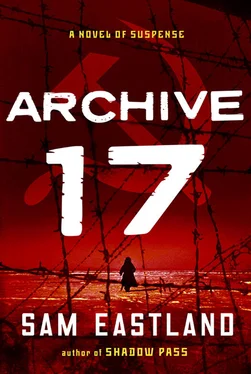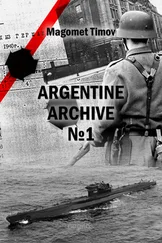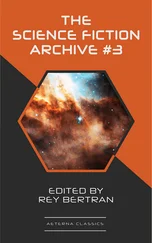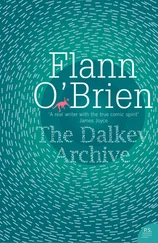Sam Eastland - Archive 17
Здесь есть возможность читать онлайн «Sam Eastland - Archive 17» весь текст электронной книги совершенно бесплатно (целиком полную версию без сокращений). В некоторых случаях можно слушать аудио, скачать через торрент в формате fb2 и присутствует краткое содержание. Жанр: Исторический детектив, на английском языке. Описание произведения, (предисловие) а так же отзывы посетителей доступны на портале библиотеки ЛибКат.
- Название:Archive 17
- Автор:
- Жанр:
- Год:неизвестен
- ISBN:нет данных
- Рейтинг книги:3 / 5. Голосов: 1
-
Избранное:Добавить в избранное
- Отзывы:
-
Ваша оценка:
- 60
- 1
- 2
- 3
- 4
- 5
Archive 17: краткое содержание, описание и аннотация
Предлагаем к чтению аннотацию, описание, краткое содержание или предисловие (зависит от того, что написал сам автор книги «Archive 17»). Если вы не нашли необходимую информацию о книге — напишите в комментариях, мы постараемся отыскать её.
Archive 17 — читать онлайн бесплатно полную книгу (весь текст) целиком
Ниже представлен текст книги, разбитый по страницам. Система сохранения места последней прочитанной страницы, позволяет с удобством читать онлайн бесплатно книгу «Archive 17», без необходимости каждый раз заново искать на чём Вы остановились. Поставьте закладку, и сможете в любой момент перейти на страницу, на которой закончили чтение.
Интервал:
Закладка:
Pekkala did not know much about royal warrants, but the strange logic of wanting but not daring to show the want or not asking in the hopes of receiving was familiar to him from other aspects of the royal family. It was the way that they maintained their grip upon those levels of Russian society which fanned out around the Romanovs like ripples from a stone thrown in a pond .
“He wants me to convince the Tsarina,” continued Rasputin .
“And you think you could?”
Rasputin breathed out sharply through his nose. “Please, Pekkala. Of course I could! The question is, will I?”
“And what is the answer?”
“I don’t know yet, and that is what infuriates him.”
“He would be even more infuriated if he knew you will be giving away his money to the next sad face that walks into the room.”
Rasputin laughed. “I give away my money because it buys me something far more valuable than cash.”
“And what is that?”
“Loyalty. Affection. Information. Everything I would have spent it on except this way I also earn friends. That’s something he will never figure out.”
“Did you really think I had come to arrest you?”
“Of course not! I can’t be arrested. Not in here. And probably not anywhere. Not even by you.”
“I would not put that to the test.” Pekkala went over to the table, found another candle, this one jammed into a wicker-covered Chianti bottle, and lit it .
With enough light now to see around the room, he looked at the flimsy sheets of silk which had been draped across the walls, the mud-caked Berber carpet on the floor, and what he at first thought was broken glass but which he realized was actually money. There were shiny coins everywhere, tossed like offerings to a fountain in every corner of the room .
“Why are you here, Pekkala?” asked Rasputin, and as he spoke he stretched out one leg, nudging aside the bottles on the table with a big yellow-nailed toe, searching for one that might have some drink left in it. “Has something caused the Emerald Eye to blink? What could it be? Not the sight of blood. You have already seen too much of that. It would not be threats. Those do not seem to bother you. No. It is something for which you were unprepared.”
“The Tsar sent for me today. There is a room beneath the palace-”
Before Pekkala could finish, Rasputin clapped his hands and roared with laughter. “Of course! I should have guessed! The Tsar has been worshipping his gold again, and it was your turn to take part in the ceremony.”
“Ceremony? What do you mean?”
Rasputin’s smile revealed a mixture of pity and amusement. “Poor Pekkala! Without me here to guide you, how would you ever understand? You see, the Tsar has already exhausted all the solitary pleasure he can take from his hoard of treasure. What he needs is an audience. What satisfies him now is the look on the face of someone setting eyes for the first time on those bars of gold. What he wants, what he needs, Pekkala, is to see the flash of envy in their gaze. It destroys them. It ruins their lives. They never recover from the shock of that longing. And no matter how much they beg him for another glimpse of that gold-and believe me they do beg-those doors will remain closed to them forever.”
“I do not envy him because of what I saw today.”
“Of course you don’t! You are not like the others. The Tsar has failed to tempt you with his Faberge eggs, his Amber Room, and the artwork on his walls. So now he has laid down his trump card, the thing which never fails.”
“But it has failed. When I looked at that pile of gold, all I could think about was the suffering of those miners. He sent in the Cossacks to kill them!” Pekkala’s voice rose in anger. “All those men wanted was the chance to work in safety, and he would not even give them that.”
Rasputin’s eyes seemed to flicker in the candlelight. “But many things are valuable precisely because they are the product of pain. Think of the pearl. It begins as a grain of sand. Imagine the agony of the oyster as that tiny piece of stone digs into the soft flesh of the creature, like a knife stabbing into your brain! So the oyster surrounds the pearl with its own living shell until at last it becomes what we value, enough to kill the oyster for it anyway-the same way the Tsar is prepared to kill his miners. The truth, Pekkala, is that beauty on this earth is set aside for the enjoyment of the few and comes at the cost of the suffering of the many. That is true for many things besides gold and pearls. It is true for the Tsarina, for example, although most of that suffering is her husband’s. Your eyes have been opened, Pekkala. You used to see the Tsar as a victim of circumstance, secretly longing to be like any other man, like a god who wishes to be mortal. You blamed the world of extravagance into which he had been born. You blamed the need of all rulers to appear larger than life, in their manner, in their wealth, in their surroundings. You even blamed his wife, I expect. Everybody else does. But the one person you could not bring yourself to blame was the Tsar himself, and so I say again-it has not failed.”
“You can be very cruel, Grigori.”
“Not as cruel as the Tsar,” he replied. “He knew that the one thing you would respect in him was the secret disregard for all his wealth, because that was the only way for you to see yourself in him. And why else would you agree to serve a man unless you held the same things to be sacred? What the Tsar did today was to show you his true face, and in that moment the man you thought you knew turned out to be a stranger.” Rasputin leveled a long, bony finger at Pekkala. “I warn you, my friend, that treasure is cursed. Even those you trust with your own life will betray you if you come between them and that gold.”
“Have you seen it?” asked Pekkala .
“Of course!” Rasputin lifted his hands and let them fall again upon the couch, sending up tiny puffs of dust from the crushed velvet. “I enjoyed the experience immensely, because I have discovered that my greatest source of pleasure is neither money nor the women who traipse into my life and get exactly what they’re looking for and who will one day swear they’ve never met me.”
“Then what is it, Rasputin?”
“What this twisted brain of mine can no longer do without”-Rasputin tapped a finger against his forehead-“is to stand at the edge of the abyss, not knowing which way I will fall.”
Six months later, the St. Petersburg police pulled Rasputin’s body from the freezing waters of the Neva River. At the spot where he had touched his forehead on that night Pekkala came to see him, Rasputin’s murderers had put a bullet through his skull .
There was a scuffling in the tunnel outside, followed by a shout and a strange crunching sound, like someone biting into an apple.
Kolchak moved over to the entrance, the knife still in his hand. “Lavrenov, what’s happening?”
“I found someone prowling around.”
Kolchak and Pekkala stepped into the tunnel.
In the middle of the narrow passageway, a man lay on his back, nailed to the earth by Lavrenov’s pickax. The man was still alive, spluttering as he struggled for breath.
“He must have followed us,” Lavrenov said.
Kolchak fetched the lantern from the cave.
Pekkala stifled a gasp as the light touched the dying man’s face.
It was Savushkin, his bodyguard. Helplessly, the man stared at Pekkala.
Knowing there was nothing he could do, Pekkala struggled to contain his emotions as he watched Savushkin’s last breath trail out.
Читать дальшеИнтервал:
Закладка:
Похожие книги на «Archive 17»
Представляем Вашему вниманию похожие книги на «Archive 17» списком для выбора. Мы отобрали схожую по названию и смыслу литературу в надежде предоставить читателям больше вариантов отыскать новые, интересные, ещё непрочитанные произведения.
Обсуждение, отзывы о книге «Archive 17» и просто собственные мнения читателей. Оставьте ваши комментарии, напишите, что Вы думаете о произведении, его смысле или главных героях. Укажите что конкретно понравилось, а что нет, и почему Вы так считаете.











